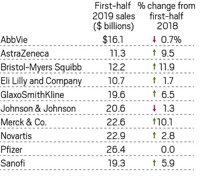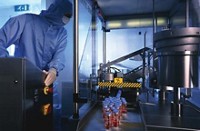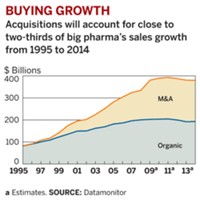Advertisement
Grab your lab coat. Let's get started
Welcome!
Welcome!
Create an account below to get 6 C&EN articles per month, receive newsletters and more - all free.
It seems this is your first time logging in online. Please enter the following information to continue.
As an ACS member you automatically get access to this site. All we need is few more details to create your reading experience.
Not you? Sign in with a different account.
Not you? Sign in with a different account.
ERROR 1
ERROR 1
ERROR 2
ERROR 2
ERROR 2
ERROR 2
ERROR 2
Password and Confirm password must match.
If you have an ACS member number, please enter it here so we can link this account to your membership. (optional)
ERROR 2
ACS values your privacy. By submitting your information, you are gaining access to C&EN and subscribing to our weekly newsletter. We use the information you provide to make your reading experience better, and we will never sell your data to third party members.
Business
Lure Of Biologics
Once kept at arm's length, biotechnology is being embraced by big pharma
by Lisa M. Jarvis
June 12, 2006
| A version of this story appeared in
Volume 84, Issue 24

Most would agree that Roche's 1990 decision to take a majority stake in Genentech was a prescient one, if not just plain lucky. The California firm has gone on to launch some of the biopharmaceutical industry's most successful drugs, and the Swiss giant now finds itself in the enviable position of getting a generous slice of the proceeds, not to mention access to a steady crop of new drug candidates.
Fifteen years later, a number of drug companies are looking for a long-term bet of their own. Biologics have taken on a more prominent role in the drug industry's pipeline, and companies are starting to expand the scope of their activities in biotechnology beyond fee-for-service technology pacts and one-product licensing deals. A recent spate of merger and acquisition activity between big pharma and biotech companies with antibody technology could signal that the hunt is on for the next Genentech.
Roche, Johnson & Johnson, Wyeth, and Abbott Laboratories have had robust biologics programs for some time, but other big names like Pfizer, Merck, GlaxoSmithKline, and AstraZeneca only recently began to fully embrace mainstream biotechnology. Though the latter group has incorporated biotech into its drug discovery efforts, biotech was primarily used as a tool to find targets for small molecules, rather than as a means of developing new products like monoclonal antibodies.
Yet biologics, predominantly monoclonal antibodies, will account for the majority of sales growth in the drug industry between 2004 and 2010, says Simon King, who is an analyst at the health care consulting firm Datamonitor.
Pharmaceutical companies have been partnering with biotech firms over the past several years, but momentum on the acquisition front appears to be growing as companies try to tap into that growth potential. The biggest recent move came last month when AstraZeneca made a $1.1 billion bid for Cambridge Antibody Technology. AstraZeneca, which already owned a 19.2% stake in CAT, says the move is part of an effort to broaden its discovery engine to biologics. By 2010, the company expects that biologics will make up 25% of its pipeline; the company has no marketed biologic products today.
Merck also dove deeper into biotech last month. The company laid out a total of almost $500 million to buy GlycoFi, which has protein manufacturing technology, and Abmaxis, which has antibody discovery and optimization technology.
Though Merck is active in biotherapeutics through its vaccines franchise, the company's clinical pipeline is completely devoid of monoclonal antibodies. Bringing GlycoFi and Abmaxis into the fold will "really position us to become a significant player in the important and growing field of biologic drugs," a Merck spokeswoman says. The purchase of the two businesses gives Merck "all elements of antibody modeling," she adds, including antibody libraries; selection, maturization, humanization, and manufacturing technologies; and antibody proof-of-concept.
But it's not just sexy technology that is attracting the pharma giants to biotech: Whereas generics companies jump on small-molecule drugs the minute patents expire, monoclonal antibodies are virtually immortal-an irresistible quality for companies that have struggled in recent years to smooth out the craters between patent expiries on billion-dollar products and the introduction of new drugs.
Monoclonal antibodies are, for now, immune to generics competition because regulatory authorities have yet to find a satisfactory pathway for approving generic biologics. The Food & Drug Administration was quick to point out that its recent approval of the first follow-on protein, Sandoz's Omnitrope, does not open the floodgates for generic biologics.
Unlike traditional generic drugs, which are therapeutically equivalent to the branded products, follow-on biologics are considered close enough to the originals to merit approval. The agency noted that Omnitrope, a recombinant human growth hormone, is nonglycosylated, making it easier to compare with previously approved growth drugs. Antibodies are decorated with sugar molecules, and this composition makes characterization much more complex.
"Making generic versions of these drugs will be extremely difficult," King says, which means that even if generics are approved, biologic products likely won't experience the rapid sales erosion that small molecules do.
Big pharma is also attracted by the vast market opportunity that antibodies seem to represent. Research in biologic drugs has largely been focused on areas with unmet needs, such as oncology.
"There's not necessarily been a lack of productivity from their own pipelines, but big pharma is lacking breakthrough drugs that can generate big margins," says Brian Rye, a biotech stock analyst at Janney Montgomery Scott.
AstraZeneca's pipeline is a prime example of that productivity rut, King says. The statin Crestor was one of AstraZeneca's most important launches in recent years, but it is essentially a me-too product.
There is also strong pressure by patient advocacy groups for the approval and insurance coverage of antibodies because they primarily address areas of high unmet need. "Even though they're more expensive than small molecules, particularly the cancer antibodies, there's an emotional need for these drugs to be reimbursed," King says.
AstraZeneca had to battle both regulatory agencies and managed care groups over approval of Crestor because there were already effective statins on the market. Meanwhile, Rye points out that ImClone's drug Erbitux has shown marginal survival benefit in patients with colon cancer, yet managed care reimbursement for the $10,000-per-month bill for the treatment has not been an issue.
With seemingly every major drug company now more willing to apply biotech beyond small molecules, the industry could see more acquisitions like those made by AstraZeneca and Merck.
But while companies are looking to bring technology in-house, they are finding that licensing opportunities are few and far between. "There isn't a huge amount of Phase III drugs lying around anymore for companies to pick up. It's a saturated market," King says.
Industry observers believe that Pfizer, which has steadily expanded its presence in the biopharmaceuticals arena in recent years, is on the prowl for additions to its portfolio of technologies and products. The company is sitting on a gargantuan war chest following the repatriation of foreign funds under the American Jobs Creation Act.
Pfizer expects its marketed biologic products, which are predominantly recombinant protein-based drugs, to generate $1.5 billion in revenues this year, and the company believes it can triple this figure by 2010.
"We will continue to invest heavily both internally and externally and look at potential acquisitions to build on the strong foundation that we have created," says Martin Mackay, Pfizer's senior vice president for worldwide research and technologies.
He points to the company's recent purchases of Rinat Neuroscience, which brought a pipeline of humanized monoclonal antibodies targeting pain, and antibody optimization technology company Bioren as prime examples of those efforts.
Like Merck, GlaxoSmithKline has a hearty vaccines franchise, but is otherwise firmly anchored in small molecules, leaving industry observers to wonder whether it will make a move into biologics. Earlier this year, Datamonitor identified Merck, AstraZeneca, and GSK as the least entrenched in biotech. The acquisitions by Merck and AstraZeneca suggest that GSK could be the next to make a purchase, King says.
But as drug companies scour the landscape for acquisitions, they may find a scarcity of attractive, affordable targets. With Abgenix and CAT off the market, analysts say Medarex and MorphoSys are suddenly looking pretty attractive. "Both have proven capabilities to generate fully human antibodies with a wide variety of targets," Rye says.
The kicker with Medarex, he notes, is that an acquirer would gain more than 30 drugs in clinical development. MorphoSys has just one or two drugs in the clinic.
Potential suitors for Medarex include Pfizer, which has a 5% stake in the company, and Bristol-Myers Squibb, which has a 50-50 codevelopment deal with Medarex for an antibody in Phase III trials as a melanoma treatment, Rye says. It remains to be seen whether Medarex will give up its independence for the right price.
There may also be interest in "companies with a hook," or firms that offer something beyond just naked antibody technology, Rye adds. Pharmaceutical firms hoping to ride the next biotech wave may look for companies with interesting conjugation technologies, such as ImmunoGen's tumor-activated prodrug technology, which links a cytotoxic molecule to an antibody for more targeted delivery.





Join the conversation
Contact the reporter
Submit a Letter to the Editor for publication
Engage with us on Twitter